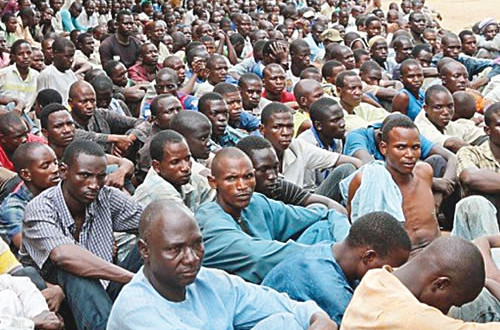Almost 500 persons arrested early hours of Sunday along the Enugu-Aba-Port Harcourt highway in southeastern Nigeria, by Nigerian soldiers. They were travelling in a convoy of three dozen buses. News reports did not mention where they were coming from, but suggested they are from across Northern Nigeria. They were reportedly travelling down south in search of jobs.
They were arrested by the military on suspicion of being ‘Boko Haram’, and all of the reporting I’ve seen has described them as ‘Boko Haram suspects’.(Should the media have refrained from that hasty categorisation?)
There has been much debate online about the arrests, with a good number of people describing it as a sad case of profiling, targeted at persons of Northern origins on account of the actions of terrorist group Boko Haram.
Here’s what I think:
The military was right to halt the journey, and decide to investigate. It is only right and proper to investigate a convoy of 30-plus vehicles travelling cross-country, considering the security situation in Nigeria at the moment. While I strongly believe that our law enforcement agents have a reputation for highhandedness and brutality, it is also important to state that in a situation like this the right thing to do was to decide to investigate.
It would be good to get answers to a number of important questions
- Who arranged the cross-country expedition – providing the vehicles, fueling them, etc.
- Where did they depart from?
- What job plans, if any, were made for the almost five hundred men at their intended destination
- Are they Nigerians, or undocumented immigrants? (That’d be a tough question to answer, in a country with poor documentation habits).
- Were any arms or dangerous possessions found on them?
If there were no arms found, and there is no proof they are not undocumented foreigners, then the men should be released with immediate effect, and allowed to continue their journey. There is no basis for trying to restrict the movement of Nigerians within their country. (Lagos Governor Tunde Fashola deserved all the flak he got last year for the ill-advised deportation of persons of southeastern origin). The only thing the authorities can do, from a security concerns point of view, is keep them under non-intrusive surveillance.
It is important to note that cross-country migration in search of greener pastures is an important part of the Nigerian story. On a visit to Yenagoa, Bayelsa state in 2013 I found out that many of the commercial rickshaw operators were from Northern Nigeria. There are lots of people from the North also in the South West, making the occasional trip back home to farm or see family. I met one of them a few years ago.
However, the idea of tens of buses rolling in a convoy across the country, laden with job-seekers, is a novel one to me.
It is also necessary for the authorities to immediately provide the men with access to lawyers. It is the prerogative of the men and their lawyers to seek redress if they feel they have been unjustly treated by the military personnel.
I have not seen any evidence that the detained men were mistreated or abused. If such has happened then the military officers responsible should be made to face disciplinary action.
In closing let’s recall two incidents from recent years:
July 2010 and December 2011, when convoys of youth from the delta made their way to Abuja to protest (in one case the non-payment of their allowances as part of the amnesty programme; in the other it was an issue related to party politics).
In both cases the groups had almost made it into the capital Abuja before they were stopped by law enforcement agents. Back then there was a lot of outcry – how did hundreds of persons make their way that far before being intercepted?
It’s hard to blame the military and the authorities for erring on the side of caution. What we can and should blame them for is any attempt to mistreat or dehumanize what I would call the ‘persons of interest’.
Feel free to disagree.
Read more: http://toluogunlesi.wordpress.com



Leave a Reply